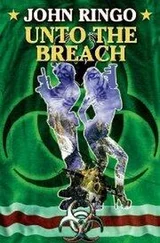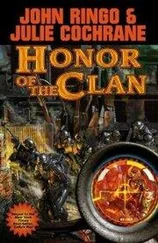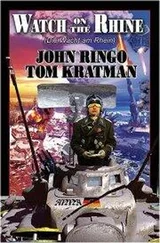“Waiting for daybreak,” the dragon replied. “If I’m going that far, I’m going to need all the thermals I can get.”
“Herzer,” Edmund said. “We need dragon resupply points along the coast. Nothing elaborate, just a stockade with some beef cattle or pigs and somewhere for the dragons to land. And more wyvern for messengers; they don’t have to be carrier qualified. As a matter of fact, it’ll be a good place to train young riders and wyverns. Joanna, leave as soon as you think wise, but the sooner the better. And that’s it, I’m done.” He got up and carried the chair back up to the pier.
“Thanks, son,” he said, handing it to the messenger.
“You’re welcome, sir,” the messenger replied.
“Have a nice night,” Edmund said as he walked off into the fire-lit darkness.
* * *
“Attention on deck!” someone called as Edmund walked into the reestablished headquarters. There simply wasn’t anywhere to put it at the docks so for the time being it had moved to the officers’ club. A cold front was in the offing and he appreciated the shorter walkÑthe O-Club was practically next door to the VIP quartersÑbut it didn’t mean he wasn’t planning on getting everything moved as soon as possible.
“Rest,” he called, waving his hand and looking first at the large map someone had pinned up on the wall. The map was clearly hand drawn, and hastilyÑseveral of the landforms were wrongÑbut it gave him a good approximation of what was going on. The approximate position of both fleets were marked as were other units at sea, most of whom were heading for the nearest secure port. The best part was the weather markings of the large storm, a “nor’easter” that had blown up.
“They’re going to get caught by the storm,” he said.
“Yes, sir,” Kabadda replied, walking over with a mug of coffee in his hand. He handed it to the admiral and Edmund took it uneasily.
“I can get my own coffee, Kabadda,” Edmund said, but he took a sip anyway. It was the way he liked it, almost a syrup with sugar and cream. Somebody had done their homework.
“We’re not quite prepared with the briefing, sir,” Kabadda said. “But we will be by 0900.”
“I doubt it,” Edmund replied. “I don’t want the short dog and pony show that you guys put on before. I need full information on all ships. What we know of their stores, information about their captains’ background and experience. I need all the intel we have on the enemy, same deal. I heard something, during the attack, about the dragons being shot at. I want information on that as soon as possible. The briefing will include as much as we know about the condition of the dragons on our ships as well as crew condition. And, especially, how long for the fleet to return and our estimated material condition when they get here. When they get in I want food waiting for them, bands playing, slaughtered carcasses for the dragons, a barbeque for the crews and decent onshore housing for everyone. They’re going to have serious casualties; I need to know the condition of our hospital establishment. We need a casualty list from them before they arrive. We’re going to have to take much the same fleet out, again , and this time we’re going to have to win. We’re not going to do that with troops that are demoralized. So the first thing we’re going to be working on is morale. Clear?”
“Yes, sir,” the chief of staff said.
“There are four aspects to winning a battle. Battle plans, which includes adequate intel, leadership, material, and morale. We are going to have a set of the first that work, bet on it. The second I’m going to be looking into carefully; what I’ve seen so far does not thrill me. The third we’re going to have to make or steal. The fourth has several parts. One of them is adequate living conditions and the knowledge that the others are as good as you can make them. When the Fleet sails again, the sailors, NCOs and officers are going to have to know that this time they are going to kick ass and not even bother taking names. Is that clear?”
“Yes, sir.”
“Send a message to the Fleet. I need information on conditions on every ship. If they don’t have a dispatch sloop, get one out to them. And tell the mer to find that other carrier . I don’t want to be surprised again. If it’s retired, and I’d bet it has, we’ll send out the resupply vessels.”
“Yes, sir.”
“Now, assign one of your officers to show me around the base facilities,” Edmund finished. “I can look into that. We’ll have the brief this afternoon. If anything comes up that needs my immediate attention, send a runner.”
“There is a large amount of paperwork, sir,” Kabadda said. “Most of it is addressed to the commander.”
“Anything that’s not from either Mike Spehar or Sheida have one of your people open and read. I’m not going to be handling correspondence from every dime-store clerk in an officer’s, or general’s, uniform that wants to joggle my elbow or know some stupid minutiae. Handle it.”
“Yes, sir.” Kabadda opened his mouth as if to reply and then shut it.
“What?”
“Admiral Draskovich felt that knowing what information was flowing was important, sir,” the general replied, uneasily.
“The term is ‘delegation,’ Kabadda,” Edmund replied. “My job is to make sure that everyone knows theirs and does it to the best of their ability. It is not to do their job for them. Mine is going to take up enough of my time.”
“Yes, sir.”
“The same goes for you,” Edmund added. “Your job is to ensure that the weapon is prepared. But you cannot do that if you’re running over every single materials or personnel list. That is what the G-1 and G-4 are for. And their job is to make sure that their people are trained, and doing their jobs, to the best of their ability. Not doing their job for them. Not nitpicking every detailÑtheir people are the ones that are supposed to nitpickÑand, most especially, not constantly micromanaging their people’s actions. If somebody screws up, you show them the error of their ways. If they can’t get their head around doing it right, after adequate retraining, you find somebody who can.”
“Yes, sir,” Kabadda said, nodding.
“Was that an automatic response?” Edmund asked. “Or did you listen?”
“I was listening, Admiral,” the chief of staff said, indignantly.
“Great. Who is going to guide me around the base?”
“I wi…” the chief of staff started to say and then smiled ruefully. “I was about to say ‘I will.’ That was the wrong answer, wasn’t it?”
“Bingo,” Edmund chuckled. “You’ve got more important things to do.”
“I’ll assign one of my aides,” Kabadda replied.
“Fine,” Edmund said, draining his coffee. “I’m going to have another cup and then talk to some of the headquarters people. I’ll probably be at this for about an hour.”
“Yes, sir.”
Edmund walked over to where a chief petty officer was hovering over a group of seamen, male and female, who were laboriously copying from a manual.
“Hey Chief,” the admiral said.
“Admiral,” the CPO replied, bracing to attention.
“Can it, we’ve got real work to do,” Talbot replied. “What’s your name, Chief?”
“Senior Chief Naoko Greter, sir,” the chief replied. “NCOIC of the signals group.”
“Well, Chief Greter, I’d kill for another cup of coffee. Where’s the urn?”
“Why don’t I get someone to get it for you, sir?” The chief chuckled. “Besom! Coffee for the admiral. That’s what runners are for, sir.”
“Delegation works.” Edmund nodded, handing the mug to a very young female seaman. “So what are you guys doing?”
Читать дальше










![John Stieber - Against the Odds - Survival on the Russian Front 1944-1945 [2nd Edition]](/books/405234/john-stieber-against-the-odds-survival-on-the-russian-front-1944-1945-2nd-edition-thumb.webp)
